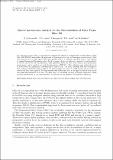Files in this item
Optical spectroscopic analysis for the discrimination of Extra-Virgin Olive Oil
Item metadata
| dc.contributor.author | McReynolds, Naomi | |
| dc.contributor.author | Auñón Garcia, Juan M. | |
| dc.contributor.author | Guengerich, Zoe | |
| dc.contributor.author | Smith, Terry K. | |
| dc.contributor.author | Dholakia, Kishan | |
| dc.date.accessioned | 2016-11-21T15:30:10Z | |
| dc.date.available | 2016-11-21T15:30:10Z | |
| dc.date.issued | 2016-11 | |
| dc.identifier | 244482764 | |
| dc.identifier | be3bbf37-7047-4655-bc3b-294696140b6b | |
| dc.identifier | 84996522123 | |
| dc.identifier | 000388275300009 | |
| dc.identifier.citation | McReynolds , N , Auñón Garcia , J M , Guengerich , Z , Smith , T K & Dholakia , K 2016 , ' Optical spectroscopic analysis for the discrimination of Extra-Virgin Olive Oil ' , Applied Spectroscopy , vol. 70 , no. 11 , pp. 1872-1882 . https://doi.org/10.1177/0003702816645931 | en |
| dc.identifier.issn | 0003-7028 | |
| dc.identifier.uri | https://hdl.handle.net/10023/9860 | |
| dc.description | We thank the UK Engineering and Physical Sciences Research Council and the European Union FAMOS project (FP7 ICT, 317744) for funding. | en |
| dc.description.abstract | We demonstrate the ability to discriminate between five brands of commercially available extra-virgin olive oil (EVOO) using Raman spectroscopy or fluorescence spectroscopy. Data was taken on both a ‘bulk optics’ free space system and on a compact handheld device, each capable of taking both Raman and fluorescence data. With the compact Raman device we achieved an average sensitivity and specificity of 98.4% and 99.6% for discrimination, respectively. Our approach illustrates that both Raman and fluorescence spectroscopy can be used for portable discrimination of EVOOs. This technique may enable detection of EVOO that has undergone counterfeiting or adulteration. The main challenge with this technique is that oxidation of EVOO causes a shift in the Raman signal over time. It would therefore be necessary to retrain the database regularly.We demonstrate preliminary data to address this issue, which may enable successful discrimination over time. We show that by discarding the first principal component, which contains information on the variations due to oxidation, we can improve discrimination efficiency. | |
| dc.format.extent | 11 | |
| dc.format.extent | 1192382 | |
| dc.language.iso | eng | |
| dc.relation.ispartof | Applied Spectroscopy | en |
| dc.subject | Raman spectroscopy | en |
| dc.subject | Fluorescence spectroscopy | en |
| dc.subject | Extra Virgin Olive Oil | en |
| dc.subject | Oxidation | en |
| dc.subject | QC Physics | en |
| dc.subject | QH301 Biology | en |
| dc.subject.lcc | QC | en |
| dc.subject.lcc | QH301 | en |
| dc.title | Optical spectroscopic analysis for the discrimination of Extra-Virgin Olive Oil | en |
| dc.type | Journal article | en |
| dc.contributor.sponsor | European Commission | en |
| dc.contributor.institution | University of St Andrews. School of Physics and Astronomy | en |
| dc.contributor.institution | University of St Andrews. School of Biology | en |
| dc.contributor.institution | University of St Andrews. Biomedical Sciences Research Complex | en |
| dc.identifier.doi | 10.1177/0003702816645931 | |
| dc.description.status | Peer reviewed | en |
| dc.identifier.grantnumber | 317744 | en |
This item appears in the following Collection(s)
Items in the St Andrews Research Repository are protected by copyright, with all rights reserved, unless otherwise indicated.

